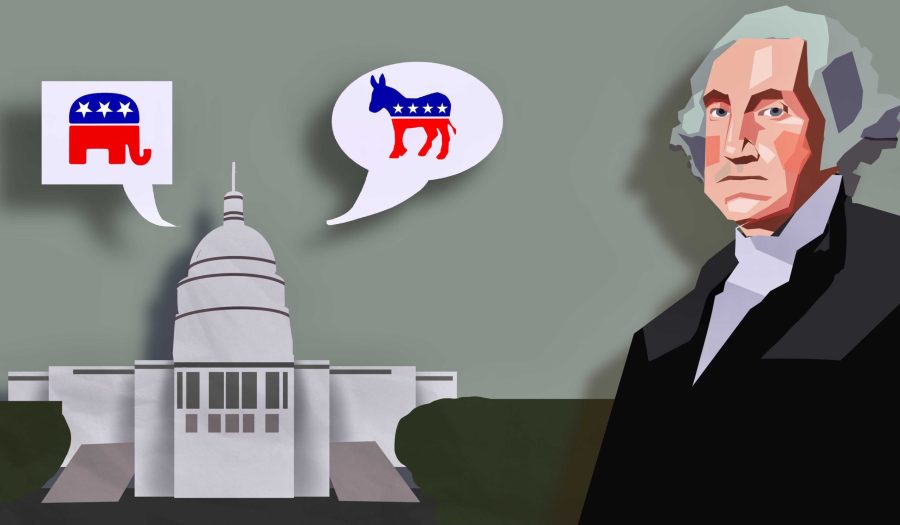George Washington was right.
The father of our country predicted riots, gridlock and corruption stemming from loyalty to political parties over loyalty to the people or country. However, our system does not allow for multiple parties regardless of public desires for such options. If a third party gets traction, it replaces one of the two prevailing factions. We need to abolish our political parties. There is a way to unite the human tendency to form groups and a no-party system, but it is important to first realize the current system’s pitfalls.
Though members of Congress passed legislation this week to prevent employees from being furloughed on Oct. 1, true funding legislation must be passed by Oct. 18 to prevent a financial default which would lead to mass unemployment. Political figures will continue to get paid regardless of a shutdown, but many people working in the federal transportation department and other sectors would be forced to work without pay. Including money to fund overseas projects has taken precedence over funding infrastructure needed by American citizens and migrants. Politicians have essentially raced to compromise on their people’s needs such as Medicaid. Partisan politics necessitates pitting two parties against each other on every issue even if one side has very little science backing them.
Our politicians are supposed to work for us: the people. But our systems have made it so they work for their respective parties and monied donors. They are who politicians listen to. The looming government shutdown was just another instance where we saw that financing the government will never consider the needs of the people as long as parties rule American politics. Necessary funding was deemed a non-priority in times of economic hardship.
Political parties also trivialize more local issues such as environmental concerns. In California, for example, “not in my back yard” versus “yes in my back yard” (NIMBY vs. YIMBY) is a debate that is unique to the state and framed poorly for those peering into Californian politics. Many moderate liberals in California are NIMBY and use environmentalist-seeming talking points to discourage increased development and infrastructure to help the working class. Essentially, they do not want working class people in their backyards. Their country club lifestyle takes precedence. Left-leaning liberals are YIMBY as they believe that the rich are to blame for most of climate change. They recognize that the rich are simply hiding behind NIMBY policies to ensure their seafront properties and luxury communities remain exclusive.
I, being from Texas, never knew that such positions could even be made. This is primarily because of the national consensus of the conservative party to reject the impacts of environmental destruction. In conservative states, it is hard to ever imagine that the wealthy suburban elite would use environmental preservation as an excuse to not support affordable housing. In discussing issues such as NIMBY, it is important to bring up statistics on the environmental impact of the wealthy versus the common man. But on the federal level, unless someone hails from a state like California, it is hard to understand why placing blame correctly on a non-partisan spectrum is important in tackling issues such as the climate emergency.
In fact, these vices of our two-party system have led to the parties drawing considerable criticism from the American public. As of February this year, 62 percent of Americans are dissatisfied with both parties, according to a poll conducted by Gallup. The de-emphasis on diverse coalition building in favor of monolithic party loyalty has led to ignorance of local concerns until they are too big to ignore, causing a seemingly drastic position change within parties. One symptom of this on the right is the rise of figures like Donald Trump, who cater to white constituents who feel the need to maintain a sense of control over what they feel is their country. The extreme shift has highlighted the left’s inability to extend their coalitions to places like rural Appalachia where there are illegitimate fears of diminishing white power. Additionally, because the right does not feel the need to include BIPOC supporters thanks to a two-party system in a still predominantly white country, albeit not for long, Trump rose from the ashes of modern-day white flight intuitions.
The time has come to reimagine what the American political machine should look like. A three-party system is a beautiful fantasy but highly impractical where single-party majorities decide elections. In a system where smaller parties can’t throw their support behind a larger party to sway majorities after an election, the best scenario is a scenario without parties. Instead, endorsements of multiple candidates standing on their own can create intersectional coalitions on certain topics which need no partisan splits.
If there are five fiscal conservatives and 20 fiscal liberals who support LGBTQ+ rights, organizational endorsements like those from The Trevor Project can help candidates build issue-based coalitions that will differ based on their viewpoint of different issues. People very naturally group with those they agree with. But this form of agreement can allow us to push some issues which are seen as very progressive or radical but actually widely supported while discussing other more contentious topics such as foreign involvement without partisan brutishness and consolidated positions backed by political machines. Every individual represents their constituents before all else. Coalitions change with every issue. That is how we get a dynamic yet forward-moving political atmosphere.
Obstacles like the shutdown have resulted from lackluster debates on deceptively complicated topics, in this case the topic being government spending. It is not just a two-sided issue of a frugal versus extravagant plan. The government is there to work for the people and be there for us. A government must spend to create a livable nation for its people. We, the public, never truly understand if politicians are amplifying us as they remain embroiled in partisan jabs. The party system just “distract[s] the public councils and enfeeble[s] the public administration,” as predicted by our first president, by presenting us with bread and circuses in the form of viral debate points.
Art by Nicholas Regli for the UCSD Guardian.















